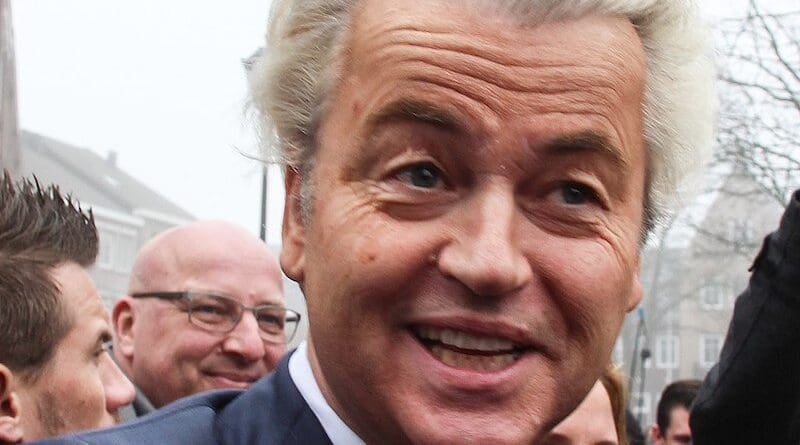Mainstream Parties In Western Europe Can’t Deny Their Role In Rise Of Far Right – OpEd
Due to the political expediency of centrist parties, bigoted nativist parties in Western Europe could potentially gain control of the European Parliament, for which elections are scheduled to be held from June 6 to 9.
Western Europe’s democratic states have had some success in setting the norms through which their diverse citizens have freely developed multiple, overlapping political, ethnic, religious or cultural identities, and they live amicably in mixed communities.
Nevertheless, Western Europe’s nativist parties have gained support for their divisive agendas and could win enough votes in elections to the European Parliament, to be held from June 6 to 9, to gain control of it. This is largely because the successful crafting of shared values and identities in multicultural societies is being wasted by some self-serving mainstream parties in supposedly mature Western European democracies. Those parties have gifted the political ground to bigoted anti-“other” extreme rightists in the Netherlands, Italy, Austria, Finland, Germany, Sweden and France by failing to contest their discriminatory assumptions. That is why Geert Wilders’ far-right Freedom Party (PVV) emerged as the largest single party in national elections in November 2023 and, after prolonged negotiations with centrist parties, including the outgoing liberal party, will now join them in a coalition government.
Inspired by the Procrustean 19th-century European idea of the nation-state, in the literal sense of the congruence of territory with culture, ethnicity, religion or language, far-right nativists and some mainstream parties fail to accept the reality of ‘our diverse country’. Some centrists have coalesced with ultra-rightists, and others are glad to be propped up by parliamentary support from intolerant nativists because they wish to assume power. Politicians subscribing to exclusivist concepts of ‘the nation’ do not even try to accommodate socio-cultural diversity. They simply can’t stand ‘our diverse country’ and want to replace ‘our state’ with ‘my ethno-cultural nation’.
However, the nation-state is antithetical to democracy, which is premised on individual freedom and equal rights for all citizens, safeguarded by the rule of law. Indeed, extreme rightists have already taken aim at the European Union’s human rights laws and its commitment to the United Nations Convention on Refugees (1951).
Allegations that Muslims are terrorists ignore the fact that violence is not the monopoly of Muslims, immigrants or natives. Ireland’s government blamed racists for attacks on working-class immigrants in Dublin. Last December Germany’s police uncovered a far-right plot to overthrow the elected government. Two years ago, Berlin warned that the hard right posed ‘the greatest extremist threat’ to Germany’s democracy. In 2011, Anders Breivik, a Norwegian terrorist hating a motley group comprising, among others, Muslims, the EU, and feminists, killed 90 young socialists enjoying a summer camp in Norway. In the 1970s and 1980s, Italy suffered terror attacks from the extreme left Red Brigades.
Citizens demand political accountability from their leaders but do they get it? Since the economic crisis of 2008, growth has slowed down in many European countries. States have neither delivered on their promises nor admitted their mistakes. Instead centrist leaders – like the ultra-right – have scapegoated dark-skinned immigrants, leading many voters to believe that a surfeit of migrants has spawned hardships ranging from fewer jobs for locals to long queues for affordable housing and healthcare for white natives. Politicians never concede that rising interest rates, cuts in public services, or sheer ineptitude created those long lines of citizens even before migrants started arriving in large numbers. Such problems empowered Geert Wilders to win the largest percentage of votes in last November’s Dutch elections by demanding that “Dutch people should be number one again…more houses…for the Dutch, with decent healthcare”; and “more money in wallets’.
Many governments fail to impress on citizens that immigrants make a considerable socio-economic contribution to their host countries. For instance, Germany needs 1.5 million immigrants every year to maintain its labour force and Italy needs 280,000.
Instead, evasive politicians fail to clarify why ‘lowly’ foreigners from developing countries are able to ‘steal’ jobs from better-educated natives. Vilifying narratives explaining migration policies that include the illegal pushback of refugees are ‘normalised’ by mainstream leaders and become part of the everyday socio-political vocabulary. Generally, nativist parties have made headway on the back of politically myopic centrist parties, which, sometimes corrupt, sometimes incompetent, have put electoral expediency ahead of good governance or because they share common ground on migration.
In fact, liberal values enhance tolerance for ethnic and cultural diversity. For instance, Bonn’s first mayor of Indian-migrant origin, Ashok-Alexander Sridharan (2015-20), viewed his South Asian roots as irrelevant and unimportant to his election campaign. Only a democracy allows social and political identities to be strengthened by their diversity.
True, racism in a Western country – like communalism in India – never disappears, but individuals belonging to ethnic or religious minorities are more likely to break through the glass ceiling in liberal democracies. Britain has an established church, but also a practising Hindu prime minister. In London, Sadiq Khan, of Pakistani origin, not only became the first Muslim mayor of a western capital in 2016 but recently won a record third term in office.
Western Europe’s mainstream parties must uphold human rights through the rule of law in managing social and political diversity to counterpoise fanatical nativists instead of joining forces with them. Liberals must challenge divisive authoritarian propagators of the nation-state with a democratic vision that celebrates cultural and political diversity so that Europe’s social harmony endures.
This article was originally published in The Wire

